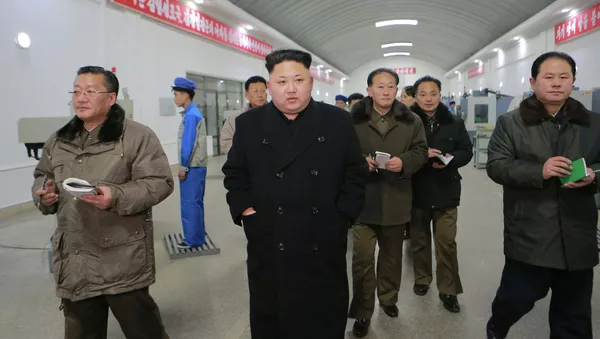Asked to comment on the Russian invitation and 'positive signals' from Pyongyang, Chinese Foreign Ministry spokesperson Hua Chunying stated that "North Korea and Russia are both friendly neighbors of China," which "have both made sacrifices and great contributions" toward the victory in the Second World War. The spokesperson added that "we believe that such engagement between the two countries is conducive to regional peace and stability."
Russian Foreign Minister Sergei Lavrov noted that he had received a positive, "first signal" regarding an invitation made late last year for Kim to come to Moscow to celebrate the 70th anniversary of the victory over Nazi Germany.
Dongguk University North Korean Studies Professor Koh Yoo Hwan told The Korea Times that Kim's decision to visit Russia before China may have negative consequences: "North Korea and Russia are trying to deepen diplomatic ties, but relations with China are far more important for the North, and should Kim choose Russia for his international debut, Sino-North Korean ties could get worse."
Seongnam-based Sejong Institute foreign and security policy researcher Hong Hyun Ik says that North Korea's delay in responding to Moscow's invitation might be seen as an attempt to "pressure on China toward a summit between Pyongyang and Beijing." Kim Jong-un has yet to meet with Chinese President Xi Jinping, who, incidentally, has also been invited to Moscow for the celebrations.
South Korean President Park Geun-hye, who has met with Xi on several occasions since taking office in 2013, has also been invited, although Hong notes that she will be unlikely to attend should Kim decide to do so. "As US President Barack Obama is not likely to go there, the US will not want Park to visit Russia either," Hong noted. AFP points out that Park has voiced her willingness to hold a summit with Kim without pre-conditions, and the North Korean leader has also voiced his willingness to hold "highest-level" talks, but it's unclear whether the two leaders will be able to come together in Moscow for the celebrations.
South Korea has already defied American and European pressure to join in on US and EU-led sanctions against Russia, opting instead to participate with Russia in an energy and transport infrastructure project known as the Eurasia Initiative.
South Korean presidential spokesperson Min Kyung-wook noted that given recent reports of a positive response from the north, "it is not the time for the South Korean government to express its stance in a hurry," The Korea Times explained.
Xi and Park are among about twenty world leaders expected to attend the May 9th celebrations in Moscow.





